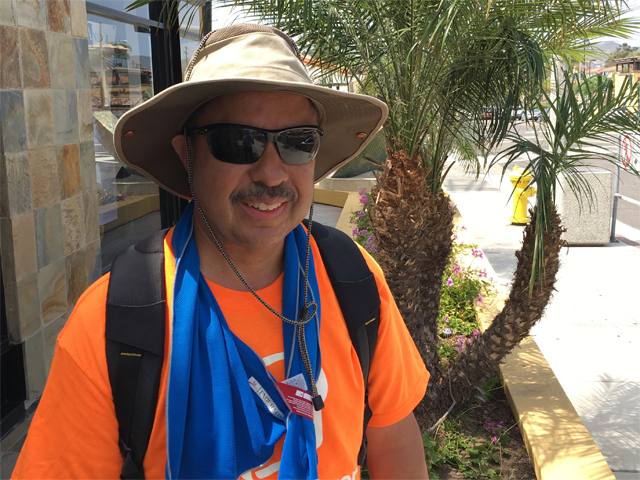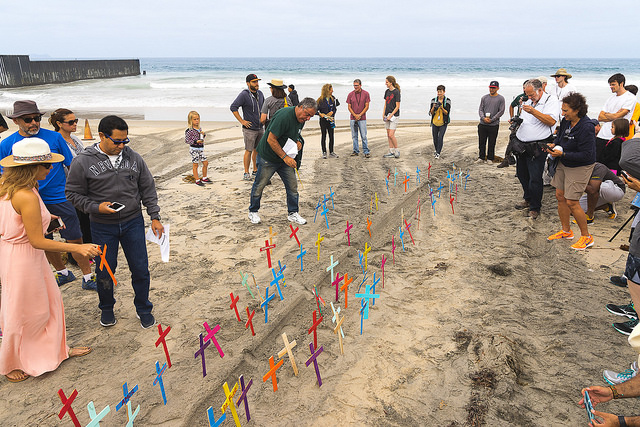
Bishop José Garcia during “El Camino del Inmigrante,” “The Walk of the Immigrant” (Photo/Esteban Garcia)
Bishop José Garcia, 63, just finished walking an average of 12 miles a day, for 11 days straight. Not for exercise, but for the basic rights of immigrants.
“El Camino del Inmigrante,” “The Walk of the Immigrant” in English, was a 150-mile pilgrimage from August 20 – 30, aimed at highlighting the challenges of the current U.S. immigration system, one of them being hunger of immigrants. The walk started in Border Field State Park on the U.S.-Mexico border and ended at the Metropolitan Detention Center in Los Angeles, with various stops in between.
Garcia, who resides in the suburbs of Washington, D.C., with his wife, is currently the director of church relations at Bread for the World – a non-partisan non-profit organization focused on educating policy makers, and the public, about hunger in the U.S. and abroad. He also serves on the board of the National Latino Evangelical Coalition.
“It’s been very emotional walking with the people and listening to all the different stories and the reasons they are doing the walk,” says Garcia who was accompanied by approximately 120 other walkers. “One of the individuals that I met told me that as they were crossing to come to the U.S., two of the people in their group got sick and were not able to keep the pace, and the coyote told them they had to leave them behind. This person told me they felt miserable, guilty, all these emotions walking away from these two individuals…”

Walk participants placing crosses in the sand. Each cross represents a deceased individual who lost their life crossing the border. (Photo/Johnny Lim)
“I would like to create awareness of the plight of the immigrant and call to attention the political leaders, especially the candidates for the Presidency, for the need of immigration reform here in our country. We are doing this advocacy, because we see the connection between hunger and immigration.”
According to research conducted by the Center for Immigration Studies, nearly 70 percent of Mexican immigrants, and their U.S.-born children, live in poverty. Many immigrant families are farmworkers who are hungry due to low wages; they also often don’t have access to health services, and work in hazardous conditions.
“Immigration reform is more than giving citizenship but dealing with the laws and systems of why people leave their countries to begin with,” continues Garcia. “These men and women are bringing values, morality, their faith, and traditions that will contribute to making this a better country. It’s not only about what they get, but what they give.”
The Christian pastor of more than two decades, says he empathizes with immigrants, because he himself migrated from Rio Piedras, Puerto Rico to the mainland U.S. at age 27. Since the island of Puerto Rico is a commonwealth of the U.S., he did not go through a lot of the legal issues other immigrants do, but some struggles he could relate to, he says.
“[I would receive] a patronizing attitude,” says Garcia, who in addition to studying at a seminary, holds a master’s degree in public health from the University of Puerto Rico and a bachelor’s degree in biology from the Interamerican University of Puerto Rico. “Because I spoke Spanish, I was considered not smart enough. There were also stereotypes about our food.”
While working as a state bishop from 2004-2014 at the Church of God of Prophecy in California, Garcia explains he was like a pastor of the other pastors in his state – making sure that they fulfill their duties.
“Pastors have different issues. Many of them had congregants who were undocumented,” says Garcia. “That’s how I began doing advocacy for them – for immigration reform. Listening to their stories are very moving. One of the things I took for granted is that people live in fear – never knowing if their families are going to be separated. They felt that they couldn’t claim those rights. That’s why I engage in this work of advocacy.”
He says a typical day for him, today, deals with meetings concerning strategies, signing letters, making press statements, representing law makers, trying to engage leaders, and mobilizing people locally.
“My favorite part of my job is being on the field with the people crying for justice who are treated unfairly,” says Garcia. “God requires us to love one another, and the scripture teaches us to care for the stranger, and that for me is an affirmation of the work that I’m doing.”
What piece of life advice would he give his younger self?
“Be informed and engage in justice for those who don’t have a voice.”
